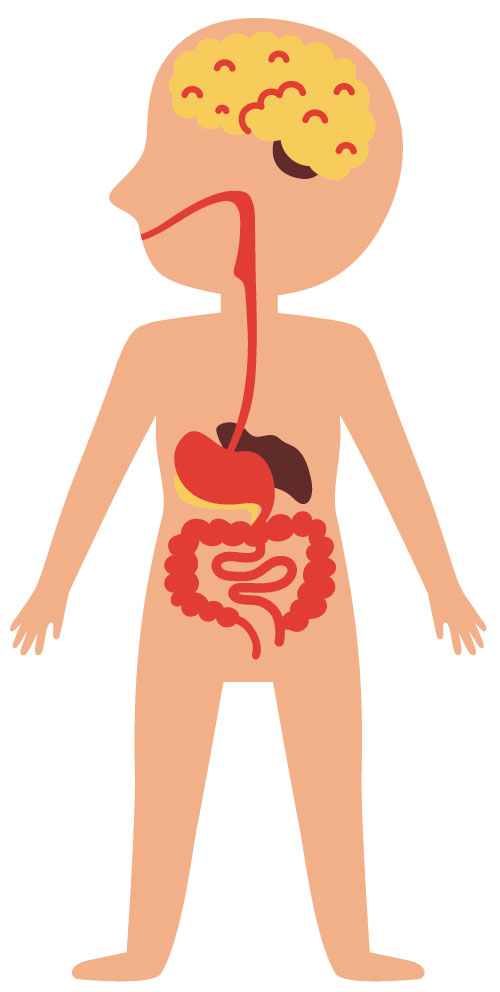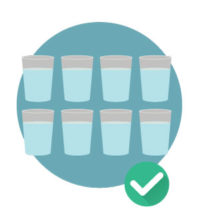Your child’s gastrointestinal (GI) system plays a very important role in his health and wellbeing. The GI system is where food is digested and nutrients are absorbed, thus it is critical to ensure that it functions optimally. In addition to these essential functions, the GI system also serves as the body’s first line of defence against disease and infection as it acts as a barrier against harmful microorganisms.
Additionally, the gut is home to various types of microorganisms collectively known as gut microbiota. They consist of a variety of bacteria which can be either beneficial or detrimental to our health. The balance between ‘good’ and ‘bad’ bacteria must be maintained in order to achieve good gut health. An imbalance of gut microbiota may lead to diarrhoea or constipation in children. Having a healthy balance will help ensure that your child’s gut health is at an optimal level, thereby leading to a healthy child.
Gut Microbiota Play Critical Role
There is a wealth of scientific evidence that shows how maintaining a healthy balance of gut microbiota helps with everything; from immunity, better nutrient absorption, better mood, and even improvements in brain function and energy levels.
In addition to this, gut microbiota are also responsible for making certain vitamins (e.g. Vitamin B12 and Vitamin K), hormones (e.g. serotonin), and metabolites which are important for good health. Interestingly, the exact makeup of the gut microbiota is completely unique from individual to individual. It is influenced by many factors, including dietary pattern.
Five Simple Steps
There are five simple yet important steps to ensure good gut health for your child, namely:
To eat right, ensure that he takes a balanced diet with moderate portions that contain a variety of foods every day. It is also important to provide him with sufficient whole grains, fruits, and vegetables as this will provide him with a healthy diet rich in dietary fibre, which are non-digestible carbohydrates. Some of these dietary fibres can serve as prebiotics which help feed the ‘good’ bacteria in his gut. These include banana, garlic, onions, shallots, leeks, and asparagus. Remember to limit his intake of deep-fried and sugary food/drinks as well.
Regular physical activity or exercise is also an important factor. Do encourage him to get at least one hour’s worth of any type of physical activity on a daily basis, e.g. badminton, swimming, running around the playground, etc. Exercise and physical activity helps his digestive system to run smoothly, by promoting regular bowel movements, improving his appetite, and helping maintain a healthy body weight.
Get him to drink enough water every day, at a minimum of eight glasses daily. More may be required on hot days or on days when he plays sports or exercises vigorously. It is a much better choice than sugar sweetened beverages which are high in unnecessary calories. By ensuring that he drinks sufficient water, you are also ensuring that his GI system is ‘lubricated’ and food can travel easily through his intestines.
Good hygiene is crucial in order to minimise or prevent bad bacteria from easily making its way into his gut. Make it a point to teach him the importance of good personal hygiene, particularly things such as washing his hands after using the loo or before meals. You may have heard some people use the phrase “cleanliness is next to godliness”, which serves to illustrate just how crucial hygiene is.
Growing children need to get sufficient sleep in order to maximise their growth potential. As a rough guide, an indicator that your child needs more sleep is if he has trouble waking up in the mornings or is constantly irritable and fussy when he is awake. The American Academy of Pediatrics issued a sleep guideline in 2016 which recommends that:
- infants (4-12 months) need 12-16 hours of sleep per day (including naps),
- toddlers (1-2 years) need 11-14 hours of sleep per day (including naps),
- young kids (3-5 years) need 10-13 hours of sleep per day (including naps),
- primary school kids (6-12 years) need 9-12 hours of sleep per day, and,
- teenagers (13-18 years) need 8-10 hours of sleep per day.
Little Helpers
The gut microbiota consists of a wide variety of microorganisms; probiotics are the live bacteria which provide us with health benefits. Ensuring that your child has a sufficient amount of ‘good’ bacteria in his body helps maintain a healthy gut microbiota balance, thus preventing or minimising any problems. Foods that are rich in probiotics normally come from fermented milk products (e.g. yoghurt, cultured milk drink, kefir and cheeses), fermented soy products (e.g. tempeh), and fermented vegetables (e.g. kimchi and pickles).
Be His Role Model
Lastly, remember that all children look up to their parents, so be sure to walk the talk in order to ensure that he has the best role model to look up to. In addition to helping pave the way to a healthier gut, this also helps bring you and your child closer together. By starting him off as early as possible, you will be well on your way to getting him to learn healthy habits and start caring for his own gut health.
An educational collaboration with Nutrition Society of Malaysia.











Comments